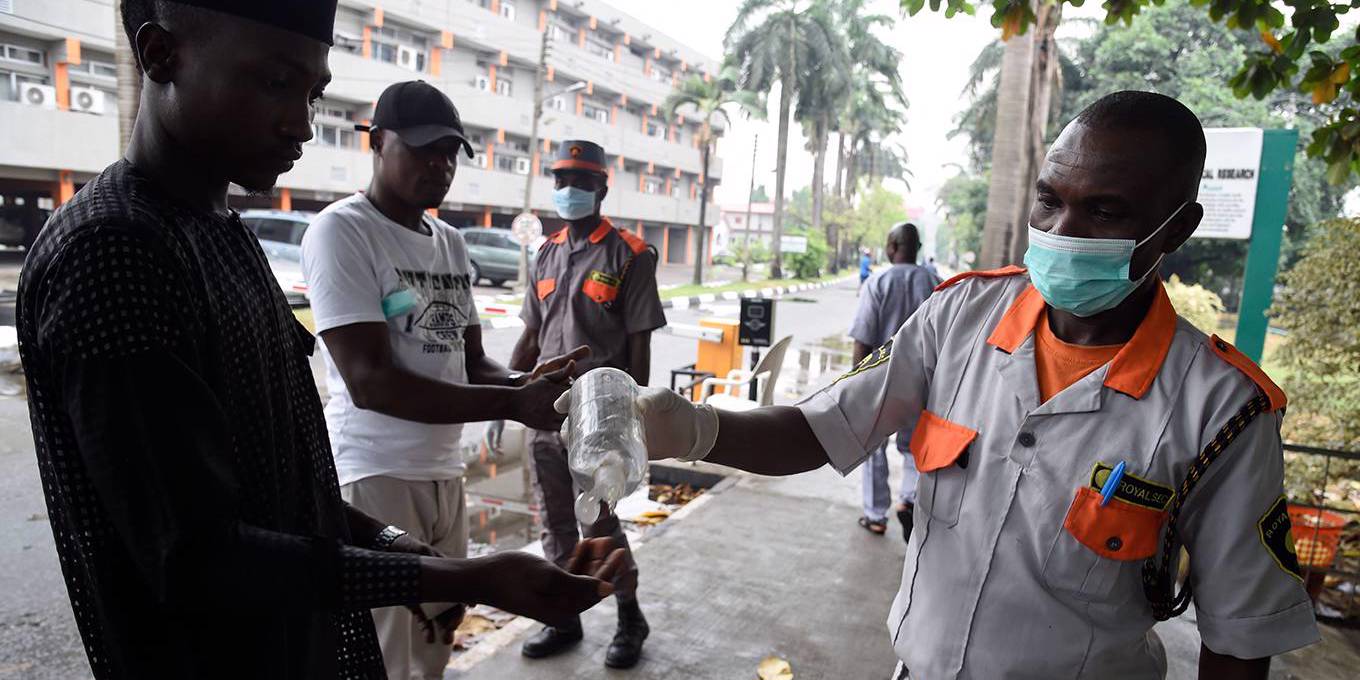X-Raying funding gaps in Nigeria’s epidemic preparedness
Funding epidemic preparedness and response (EPR) is indeed a multifaceted affair; it requires the funding of a wide-range of interdependent structures and systems, from surveillance infrastructure to sample collection system and testing laboratories.

Without sufficient financial investment by governments at federal, state and local government levels, it is obviously impossible to achieve an operational EPR system – one that is capable of effective prevention, detection and response to the outbreak of infectious diseases.
Despite its significance in safeguarding the health and wellbeing of the people, governments at all levels in Nigeria do not seem to be keen on funding the gradual development of crucial epidemic preparedness infrastructure. Consequently, institutions such as Nigeria’s premier public health institute, the Nigeria Centre for Disease Control (NCDC), are being underfunded. As a result, the NCDC is relying on donors to fund many of its projects without which the agency’s functions may be greatly constrained.
Nonetheless, the NCDC, which is mandated to enhance the country’s “preparedness and response to epidemics through prevention, detection and control of communicable and non-communicable diseases” was recently removed from the list of federal government agencies that could access the statutory Basic Health Care Provision Fund (BHCPF). Whereas the 2018 BHCPF guidelines allocated 2.5% of the Fund to the NCDC, the new 2020 guidelines didn’t allocate same to the agency.
Gaps at national, state and LGA levels
Looking at Nigeria’s overall funding for public health gives one an insight into the country’s obvious low level of funding for epidemic preparedness. Despite being the host of the defunct Organization of African Unity’s special summit that led to the 2001 Abuja Declaration in which African countries pledged to dedicate at least 15% of their annual budgets to healthcare, Nigeria is yet to dedicate such amount of its annual budget to public health. Instead, from 2001 to date, Nigeria’s annual public health spending has fluctuated between 4% and 7% of its national budget.
Consequently, funding for epidemic preparedness and response has never received its deserved attention. Felix Obi, a research fellow at the Nigeria Health Policy Research Group (HPRG) cum Africa representative on the board of Health Systems Global (HSG), decries Nigeria’s low-level funding for epidemic preparedness adding that the fact that governments at all levels in Africa are not keen on funding epidemic preparedness could be linked to the unpredictable nature of outbreak of infectious diseases.
“In Africa, we have a tendency to pray for bad things not to happen to us but this doesn’t mean we shouldn’t prepare, in case they happen. Consequently, we are relying on donors such as GAVI and Global Fund to fund our response to disease outbreaks. We are not sustainably funding public health emergencies and health in general. This arrangement is unsustainable hence the cries by public health advocates in Nigeria for the government to put in sufficient funding for strengthening the epidemic preparedness architecture,” Obi said.
Prof Oyewale Tomori, the foremost Nigerian virologist cum former Africa regional virologist at the World Health Organization (WHO), reasons the COVID-19 pandemic has shown Nigeria the implication of not adequately investing in epidemic preparedness. “There is no reason why we should be building labs now; that is akin to making ammunition at the warfront. Recently, the states were given ₦100 million each to respond to COVID-19. Now, I heard they are again going to receive ₦1 billion each. Where were all these funds before now? We could have progressively built the necessary preparedness infrastructure, overtime. I hope the Covid-19 experience would make us have a rethink.”
Tanimola Akande, a professor of public health at the University of Ilorin describes Nigeria’s current funding for epidemic preparedness as not sufficient for effective response to disease outbreaks. “As we say in public health: ‘Prevention is better than cure.’ If you don’t put the necessary measures in place, you will have a bigger problem to deal with when there is an outbreak. Consequently, gaps exist at all levels – from national to LGA level. It is even worst at LGA level where such funding do not exist at all; there is hardly any LGA in Nigeria that has a budgetary provision for epidemic preparedness. At national level, what is provided or in the budget is not as bad as when you compare it with what is actually released,” he lamented.
Akande says whereas the situation at national level looks bleak its even bleaker at state-level where funding for epidemic preparedness is merely ‘theoretical’ as hardly are any funds ever released for epidemic preparedness – until there is an actual outbreak – thus by the time the funds are released, the epidemic would have already taken its course. “At state-level, it’s almost theoretical that they have funds for epidemic preparedness, the actual release is hardly made. It is until there is an outbreak that they will be running helter-skelter to secure funds to respond. In reality, what they fund is the response – and not preparedness. That is unfortunate because you would be spending less on response if you spend more on preparedness.”
The professor of public health believes there is a sinister reason why governments may not want to fund epidemic preparedness and would rather fund the actual response. “Twenty years ago, we were investigating the outbreak of meningitis in a certain LGA and during our investigation we realized it wasn’t the health workers that reported the outbreak; instead, it was a community leader that reported it. So, we later discovered that the LGA officials would rather not report an outbreak until it becomes big so they can get to remove a lot more money out of the system to respond to it. That approach is horrible!”
Nigeria and International Health Regulations
Nigeria is signatory to the 2005 International Health Regulations (IHR), a voluntary agreement signed by all WHO member states to collectively work towards achieving global health security including reporting events of international public health importance. Subsequently, in 2017, Nigeria opened up its public health security infrastructure to the Joint External Evaluation (JEE), a collaborative, multi-sectoral assessment of countries’ level of preparedness and response capabilities for epidemics, meant to help them identify and close gaps in epidemic preparedness.
Based on the outcome of the evaluation, Nigeria was ranked 19th out of the 42 countries in WHO’s Africa region. And on ReadyScore’s scale of 0 to 100 based on the same JEE, Nigeria only managed to score 39. Resolve to Save Lives, a nonprofit focused on preventing epidemics, considers countries with a ReadyScore of above 80 as better prepared for an epidemic while those with ReadyScore of between 40 and 79, as still having more work to do. Moreover, Resolve to Save Lives describes countries with Ready Score below 40 (such as Nigeria) as simply not prepared to respond to emergencies!
It was as a response to the country’s dismal performance in the JEE evaluation that Nigeria came up with the 2018 -2022 National Action Plan for Health Security (NAPHS), as a strategic roadmap aimed at filling critical gaps identified by the JEE. The NAPHS, which was a result of a nationwide consultative and participatory process, covers 19 technical areas across prevention, detection, response as well as other IHR-related hazards.
The estimated cost of the 5-year strategic health security action plan is NGN134 billion ($439 million USD) and its implementation will, amongst others, require the active involvement and contribution of the federal, state and local governments including the establishment of Emergency Operation Centres (EOCs) across all 36 states of the federation. NAPHS aims to strengthen surveillance, preparedness, response, laboratory networks across the three tiers of government as well as strengthen public health workforce across the country.
According to the NCDC-costed NAPHS, Nigeria would need roughly US$0.40 per person per year to establish an effective preparedness infrastructure capable of protecting its citizenry. This clearly explains why Nigeria must ensure the effective implementation of the Plan as well as improving funding for the National Centre for Disease Control (NCDC). For, it is only in committing adequate financial, human and technological resources by governments at all levels that Nigeria can successfully drive the implementation of NAPHS. Sadly, years after it was formulated, not much progress had been recorded towards implementing this all-important plan.
Yet, it is only by effectively driving the implementation of its health security action plan, amongst other key actions, that Nigeria could achieve a truly resilient health security infrastructure, one that is capable of satisfactorily serving as the first line of defense against any potential outbreak of epidemics. “They say: ‘When you fail to plan you are planning to fail.’ In this case, we have a plan but we are failing to implement the plan. We don’t find it difficult to draw up beautiful plans in Nigeria but implementation of the plan is the issue due to lack of funding and political will,” laments Akande.
The economic cost of not funding epidemic preparedness
It is obvious the lack of appreciation of the nexus between funding for epidemic preparedness and the country’s sustainable human capital and economic development is why governments at all levels in Nigeria are not seeing good enough reasons to make the necessary investment in epidemic preparedness. Doubtlessly, the COVID-19 pandemic has shown us what damaging impact an outbreak of infectious disease can have on various aspects of our personal and economic lives.
Tomori believes it is because emergency preparedness and public health in general, are not tangible issues like infrastructure that governments are not keen on investing in it, adding that without a healthy people, there will not be a healthy economy. “COVID-19 is showing us the cost of not investing in epidemic preparedness and response; even if that is a severe case of the consequences. We have also seen what happen to countries like Guinea, Sierra Leone and Liberia with the Ebola outbreak. Although bauxite is the mainstay of their economies, all the bauxite mines disappear during the Ebola epidemic and the cost was over USD2billion.”
Dr Gafar Alawode, project director of the Prevent Epidemics (PE) Project, aimed at boosting domestic spending on epidemic preparedness and response, says although Nigeria had in recent years showed increased commitment towards funding epidemic preparedness including allocating 2.5% of the BHCPF to the NCDC. However, he described the removal of the NCDC from the list of beneficiaries of the Fund in the 2020 guidelines as a big setback to the country’s quest to build an effective EPR mechanism.
“Epidemic preparedness requires funding; countries like Taiwan were able to contain the COVID-19 pandemic even without lockdowns because they have effective epidemic preparedness systems. In contrast, we have seen how the pandemic affected all aspects of our economy from aviation to education and healthcare. Going forward, if we don’t pay attention to our ability to detect and respond to epidemics, they will continue to have negative consequences on our economy. A lot of studies on the impact of the pandemic on our economy are underway, the full picture will be out soon,” said Dr Alawode.
Ultimately, the degree of investment in epidemic preparedness by governments at all levels in Nigeria will have a direct bearing on the health and wellbeing of its citizens and consequently, on Nigeria’s economic development. Indeed, no country which aspires for sustained human capital and economic development pays leap service to funding epidemic preparedness. As they say: A healthy nation is a wealthy nation – and Nigeria cannot be an exception!
This solutions-based story was produced with the support of Nigeria Health Watch, through the 2nd Prevent Epidemics Naija Fellowship, aimed at raising the profile of epidemic preparedness and generate support for robust epidemic preparedness funding.















